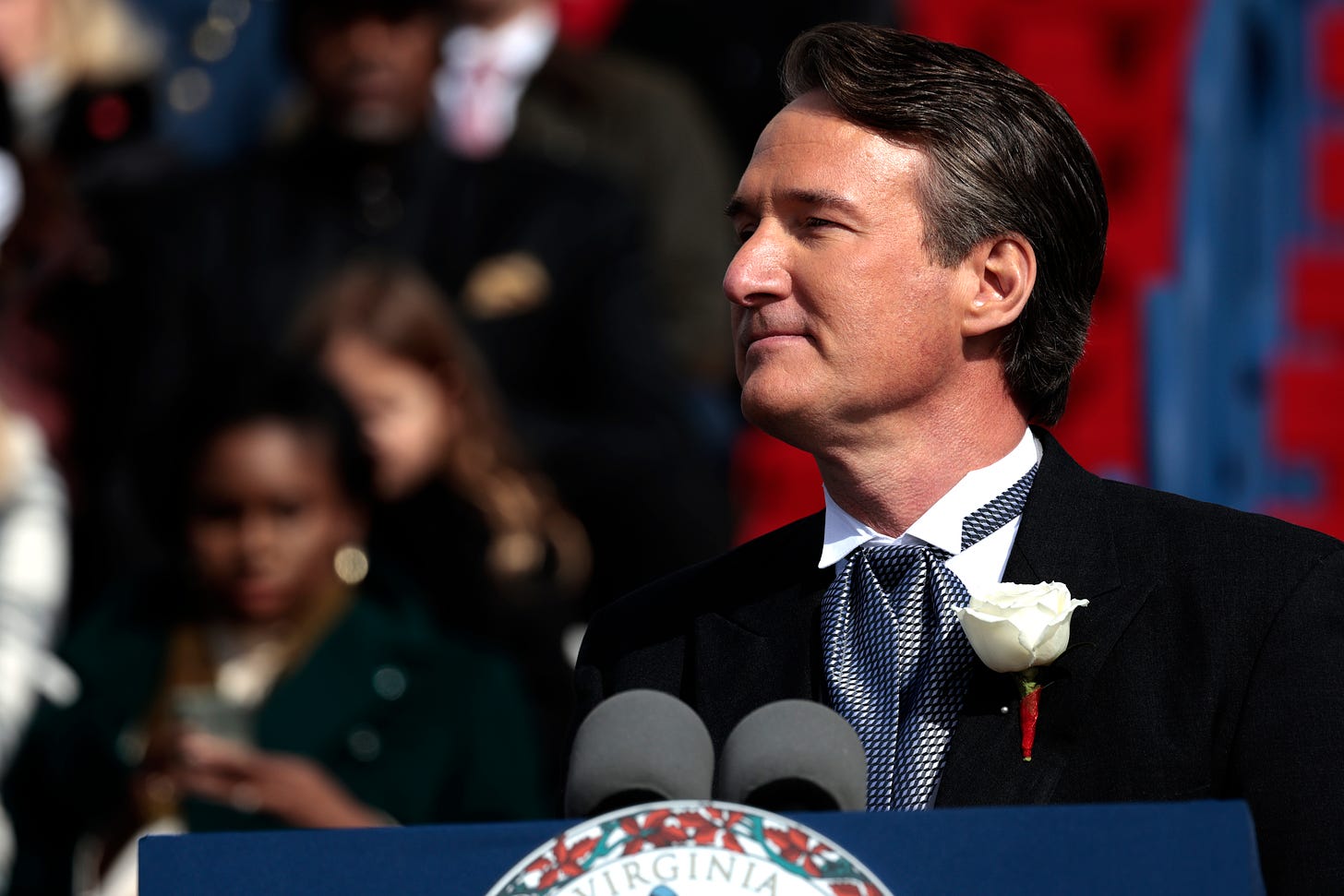With Trump Indicted Again, Is This Glenn Youngkin’s Moment?
If the Virginia governor seems like the GOP’s dream 2024 nominee, Virginia Senate Democrats deserve some thanks.

IS THIS REALLY IT? Are Republicans doomed to field as their 2024 nominee a lying, multiply indicted loser whose calendar is so crammed with criminal and civil trials, and whose actions are so egregiously unpatriotic, that even his former vice president says he “should never be President of the United States”?
Maybe not. Maybe this is Virginia Gov. Glenn Youngkin’s moment.
As he teases Republican donors about the possibility that he will swoop in to save the day, Youngkin could not have asked for better liftoff conditions: over 200,000 more people employed in the state since he took office 18 months ago, which his team notes marks Virginia’s highest labor-force participation since 2013; record fundraising hauls; a personal-best 57 percent approval rating, which he achieved in a state that gives no special welcome to GOP politicians; and his party’s two leading presidential contenders looking ever less viable.
Right now Youngkin has the allure of an ambitious politician who is hanging back, seemingly reluctant to step into the national fray, as bigwigs like Rupert Murdoch anxiously hope he will. Former President Donald Trump, meanwhile, sinks further into self-pity and grievance with each new indictment. And the wandering eyes of prospective donors underscore the decline of Trump’s onetime chief rival, Florida Gov. Ron DeSantis. He had scheduled two July fundraisers in the Hamptons, the Long Island vacation retreat for the rich and famous, but canceled them for lack of interest—even after reducing tickets to half price. Trump-era Commerce Secretary Wilbur Ross, meanwhile, is holding a fundraiser for Youngkin on Friday at his mansion in the Hamptons.
Will Youngkin be the one that got away? He says he is completely focused on Virginia’s legislative elections this fall. His party holds the House of Delegates by four seats while Democrats hold the state Senate by two seats. The Washington Post says the governor has “promised an all-out fight for supremacy in the legislature.”
But, in the spirit of Be careful what you wish for, if Youngkin gets the legislative supremacy of his dreams, he could also get the policies of his dreams. And if he gets the policies of his dreams, then it’s curtains for the suburb-friendly, fleece-vested dad image so effective in Virginia and perhaps across the country, too. That kind of success would put him on a path to becoming the next DeSantis.
The Florida governor won re-election last year by 19 points, a spectacular margin that emboldened him to harness his simpatico legislature; impose his personal, political and religious values on a diverse state; and enter the 2024 campaign as the right-wing hero who would conquer “woke.” But now he has two potentially fatal political problems.
One is that many Republican voters and donors find DeSantis’s personal and management skills lacking. His campaign trail interactions can be cold and awkward, and his operation is undergoing turmoil: He recently laid off 38 staffers as part of a major reset (among them an aide apparently fired for putting Nazi imagery in a video). DeSantis’s other problem is that, apart from those on the right who love the multifront culture war he is waging in his state, voters hear his promise to “Make America Florida” as a threat. There’s a reason DeSantis and his legislative allies are experiencing what Politico calls an “endless summer of litigation”: They stand variously accused of violating rights, privacy, the Constitution, the law, and human decency.
This means DeSantis is 0 for 2 among the middle-of-the-road swing voters whom anyone needs to win a general election. And for their part, Republican primary voters who might be open to his message doubt his chances in a general election. In a new poll, almost half of them say he’d be a weaker nominee than Trump. If electability is the point, then what’s the point of DeSantis?
FOR YOUNGKIN, THE POINT OF DESANTIS is to offer a demonstration of how legislative supremacy can backfire. One example: Puck’s Tara Palmeri reported in April that “Republican mega donors worry Ron DeSantis may have nuked his remaining credibility” by signing a six-week abortion ban. The same month, the Financial Times quoted a major DeSantis donor saying he’s put himself “on hold” over the governor’s abortion and book bans.
Youngkin is no moderate, but he’s been perceived that way—so far, at least. In part, that’s thanks to the “brick wall” of Democrats who control the Virginia Senate. Though Youngkin is trying to consolidate his divided government into a Republican bastion, not having the run of the place has helped him avoid falling through many ideological trap doors.
Here’s an experiment you can try at home: Google the phrase “Virginia Senate kills.” You’ll see an interesting list of blocked legislation. State Senate Democrats killed three Republican measures that would have banned or restricted abortion, including a Youngkin-backed bill that criminalized most abortions after 15 weeks of gestation. They killed a dozen bills that targeted transgender rights. They killed bills that would have banned teaching “inherently divisive” concepts in public schools, charged drug dealers with murder, repealed Virginia’s commitment to stringent California emissions standards, and given permanent tax cuts to both corporations and individuals.
Still, Youngkin hasn’t needed an all-GOP legislature to move rightward. His first executive order banned the teaching of critical race theory in public school classes even though, as the Virginia Board of Education repeatedly said, it is not in the state’s K-12 curriculum. He created an email tip line for parents to report concerns about “divisive concepts” and practices, but it generated few relevant reports and lasted only several months. His controversial guidelines for transgender students on sports, bathrooms and locker rooms, pronouns, parental involvement, and other issues may draw legal challenges, and he has declined to say if he would sign (so far theoretical) bills to restrict or ban gender-affirming care for minors. His administration also helped kill a bipartisan bill that would have blocked law enforcement access to menstrual data stored on electronic “period trackers.”
Beyond his policy preferences, Youngkin has sent clear signals of solidarity to his party’s MAGA contingent—maybe even enough to avoid getting lumped with oblivion-bound “non-MAGA normies,” in Tim Miller’s phrase. They include campaign appearances last year with Kari Lake and other election deniers, his reaction (Two-tiered justice! Sad day!) to Trump’s accelerating legal travails, and a recent CNN interview in which he said he will “back whoever the candidate is,” even if it’s Trump.
Youngkin is also—presumably acting under pressure from people who believe in right-wing conspiracy theories—the latest GOP governor to quit the Electronic Registration Information Center, a nonpartisan organization that helps states to update their voter rolls and make sure people don’t vote illegally in more than one state. And he pulled Virginia out of contention for a $3.5 billion Ford electric battery plant and the 2,500 jobs it would have brought to a struggling area sorely in need of them, over concerns about Ford’s partnership with a Chinese company he called “a front for the Chinese Communist Party.” Tough-on-China message, delivered. Ford stuck close to home and Michigan Gov. Gretchen Whitmer ended up with bragging rights.
Puck’s Palmeri reported in March that if Youngkin jumped into the White House race, it would happen late this year “after either: 1) DeSantis fizzles, or 2) Trump and DeSantis effectively mutilate one another so thoroughly that they create a lane for a third option.” Scenario 1 is actually happening and Scenario 2 (which I also posited, after the 2022 DeSantis blowout win) is not. But there is a developing Scenario 3: such serious, voluminous and mounting charges against Trump that his support could crumble the way Ernest Hemingway described how a fictional character’s bankruptcy happened: “Two ways. Gradually and then suddenly.” The slow softening has begun; a fast collapse could follow.
What would Youngkin offer? Skills in “political acrobatics,” as the Washington Post put it somewhat euphemistically. More than any other top Republican, and as Virginia Democrats learned to their dismay, Youngkin seems to grasp how to juggle the different demands of a primary versus a state or national general election. For instance, he ran in 2021 on two kinds of parental rights: how and whether certain culture-war topics should be taught (a conservative preoccupation), and a more broadly popular push to reopen schools faster for in-person instruction as the pandemic ebbed. He was explicit at one point in the campaign about keeping his abortion views under wraps. “When I’m governor, and I have a majority in the House, we can start going on offense,” he said in a conversation with abortion-rights advocates who were posing as conservatives opposed to abortion. “But as a campaign topic, sadly, that in fact won’t win my independent votes that I have to get.”
He was right about that, as polls show most Virginians want to keep their current law (a ban on abortion after viability, with some exceptions) or make it less restrictive. A year ago, installed as governor and unable to run for re-election under Virginia law, Youngkin assured a conservative group that “Any bill that comes to my desk I will sign happily and gleefully in order to protect life.” He also said he believes life begins at conception, but a 15-week ban might be the best he could do unless Republicans flip the Senate in 2023. “My goal is that we, in fact, get a bill to sign. It won’t be the bill that we all want,” he said—but he declined to detail what that bill would be.
Youngkin did not reach that goal, but an all-Republican legislature would certainly send him a 15-week ban or something far more limiting. And that would be just the start of passing all or most of the conservative wish list that the governor could not get this year. The policy victories would coincide with early primary contests—good timing for a shiny new candidate with an obvious elevator pitch: DeSantis with interpersonal skills and Trump without indictments.





